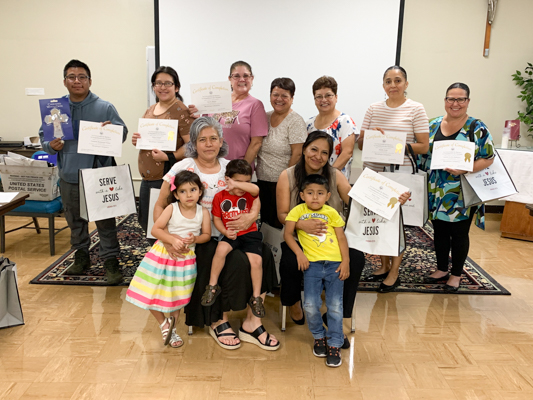Institute for Pastoral Initiatives News

Growing as catechists and as a community, online and offline
While the VLCFF is a virtual platform, facilitators are no strangers to bringing lessons into the “real world.”
Heidi Acuña, from the Hispanic Ministry & Faith Formation at Immaculate Conception parish in Dayton, is one such facilitator. This summer, Heidi led an in-person VLCFF course titled "Metodología Catequética" (Catechetical Methodology) for 14 Spanish-speaking catechists. The students came into the course with a wide range of experience levels and left with new insights.
“One of the more experienced catechists stated that the course opened her eyes to various approaches to catechesis and pedagogy that she had never explored," Heidi said.
To enhance the learning experience, the catechists were allowed to incorporate the methodologies and pedagogical techniques taught during the course into their practical work. This involved using lessons from the newly adopted bilingual textbooks and aligning them with the assigned grade-level standards. By doing so, the catechists not only explored the new material but also processed the information in a meaningful way.
As a final project, the catechists were divided into teams and tasked with creating their own lesson plans. These plans had to incorporate the methodologies learned during the course and various questioning techniques to encourage deeper levels of learning. The groups then presented their lessons to the rest of the participants, fostering a collaborative and interactive learning environment.
Another significant benefit of facilitating the course in person was the opportunity to build a sense of community among the catechist team. Heidi sees the relationships built during this course as foundational for a catechetical community.
“St. Mary’s has a well-established faith formation program, whereas this is Immaculate Conception’s initial year of offering a formal catechesis program for children," she said. "The hope is that the relationships built between the experienced catechists during the course will provide mutual support as we journey into the next year.
In conclusion, the in-person VLCFF course, "Metodología Catequética," exemplifies the power of bridging the virtual and real worlds of education. It not only equipped catechists with valuable pedagogical insights but also encouraged them to put theory into practice, fostering a deeper understanding of catechesis. Through collaborative lesson planning and interactive presentations, a sense of community blossomed among the catechists, laying a strong foundation for future endeavors. As we reflect on this transformative experience, it becomes evident that the VLCFF is not just a virtual platform—it's a catalyst for growth, innovation, and the nurturing of lasting bonds within the catechetical community.
